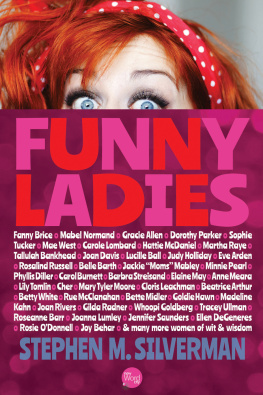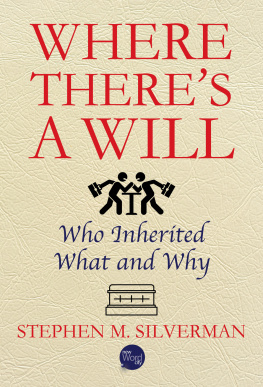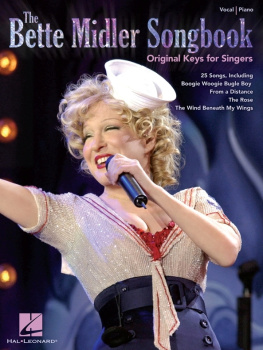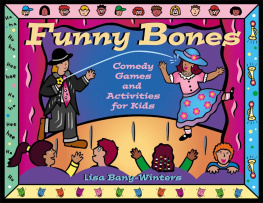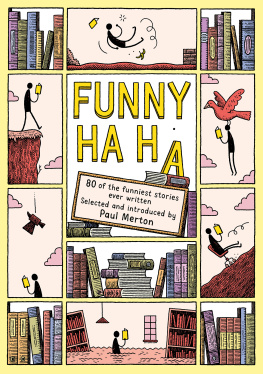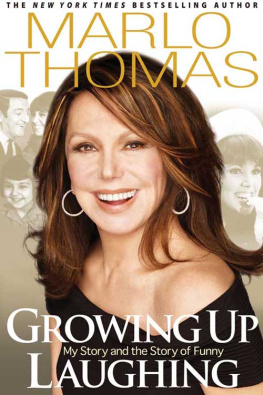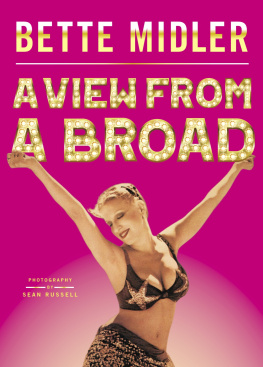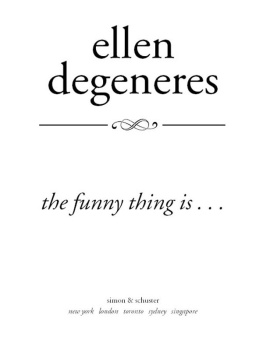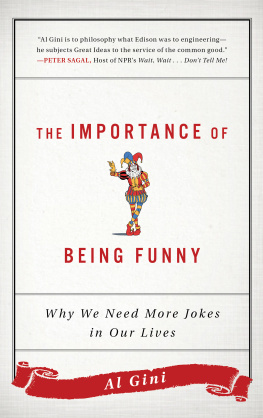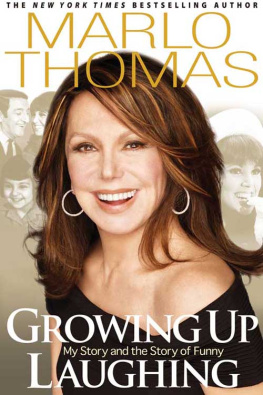Stephen M. Silverman - Funny Ladies
Here you can read online Stephen M. Silverman - Funny Ladies full text of the book (entire story) in english for free. Download pdf and epub, get meaning, cover and reviews about this ebook. year: 2018, publisher: New Word City, Inc., genre: Non-fiction. Description of the work, (preface) as well as reviews are available. Best literature library LitArk.com created for fans of good reading and offers a wide selection of genres:
Romance novel
Science fiction
Adventure
Detective
Science
History
Home and family
Prose
Art
Politics
Computer
Non-fiction
Religion
Business
Children
Humor
Choose a favorite category and find really read worthwhile books. Enjoy immersion in the world of imagination, feel the emotions of the characters or learn something new for yourself, make an fascinating discovery.
- Book:Funny Ladies
- Author:
- Publisher:New Word City, Inc.
- Genre:
- Year:2018
- Rating:5 / 5
- Favourites:Add to favourites
- Your mark:
- 100
- 1
- 2
- 3
- 4
- 5
Funny Ladies: summary, description and annotation
We offer to read an annotation, description, summary or preface (depends on what the author of the book "Funny Ladies" wrote himself). If you haven't found the necessary information about the book — write in the comments, we will try to find it.
Jam-packed with jokes, funny stories, and stand-up routines, this guide to Americas funniest women covers more than seventy-five famous comediennes, including Carol Burnett, Ellen DeGeneres, Whoopi Goldberg, Goldie Hawn, Bette Midler, Mary Tyler Moore, Joan Rivers, Lily Tomlin, and others.
Funny Ladies — read online for free the complete book (whole text) full work
Below is the text of the book, divided by pages. System saving the place of the last page read, allows you to conveniently read the book "Funny Ladies" online for free, without having to search again every time where you left off. Put a bookmark, and you can go to the page where you finished reading at any time.
Font size:
Interval:
Bookmark:
Dramatis Personae: One COMBATIVE COMIC (obviously a product of the times, and a she, though dressed in non-gender-specific clothes) and one WEARY AUTHOR (obviously a product of having sat through hundreds of hours of audio- and/or videotapes and film clips, and having read performance transcripts, news articles, magazine profiles, and, the worst of the lot, celebrity bios. Oh, and though delving into this topic, hes a he, dressed down).
Setting: They are sitting in a booth of a Manhattan coffee shop, not Toms on the Upper West Side (which is still overrun with tourists anxious to see where the Seinfeld gang talked about nothing), but a reasonable facsimile. Shes on her fourth cup of black coffee; hes nursing an orange juice to ease up on caffeine. (Writing does take its toll.)
Time: A minute ago.
Combative Comic: W hats this?
Weary Author: A book
CC: I see its a book. Whatd you think I thought it was, a g******n toaster? Whats it called?
WA: Funny Ladies.
CC: F**k.
WA: Thank you.
CC: Am I in it?
WA: In part.
CC: What part? My p***y?
WA: Well, that does seem to go with you everywhere you go. But, no, more than that. Your predecessors. Those who paved the way for you to be here today. Along with your p****.
CC: S****y title. Couldnt you think of something more hip? Like, Why Did the Chick Cross the Road?
WA: I dont think Gracie Allen would fit comfortably into a book called that.
CC: Gracie Allen? Cool. Marilyn Monroe?
WA: Not a funny lady. A sex icon. Shes not in the book.
CC: Madonna?
WA: A pop singer, and marketing expert. Not in the book.
CC: How did you decide who was f****g good enough to be in it?
WA: A tough call. Lucille Ball, obviously...
CC: I f*****g love Lucy.
WA: Stand in line. Lucy, in person, it was said, wasnt funny. She was a terrific actress who knew exactly how to deliver what the script said to do. And just look how she made us laugh. So shes a funny lady. Tallulah Bankhead, on the other hand, wasnt known as a clown when she performed, yet her off-stage behavior was so outrageously hilarious that she qualifies.
CC: Well, whoopee.
WA: Yes, shes in it, too.
CC (thumbing through book): Cool. How is this thing organized?
WA: Quasi-chronologically, in order of the heyday of these women.
CC: Your favorite?
WA: Heyday?
CC: Funny lady, you a*****e.
WA (thinking of how much hed prefer having this conversation with Elaine May): Certainly Im biased toward the ones I grew up with. Im a baby boomer. I lean toward Lucy and, if memory serves, Joan, Suzie McNamara, Miss Brooks...
CC: Sounds like a buncha cool, f****g babes.
WA: Well, no. That they didnt do in the fifties.
CC: So, in order to be a funny lady, they had to be on TV?
WA: Not really. But by the fifties, actresses who could play comedy were on TV. In the early 1900s, the place for funny ladies was burlesque, or, if they were lucky - and really funny - vaudeville. Back then the stage wasnt thought to be a proper place for what was considered the fairer sex.
CC: F**k.
WA: So lets just say the early training ground was the theater, which was basical ly the only medium available until the flickers caught on, around 1914. By then Sophie Tucker had just made the leap from singing in her parents restaurant to the stage of the Palace, which was the vaudevillians Valhalla.
CC: So, if Id lived in the twenties...
WA: Youd have found it tough going. Youd have had to do vaudeville or be in a stage revue, if not burlesque. And with a mouth like yours, it probably would have been burlesque.
CC: F**k you.
WA: See? Radio then didnt catch on until the thirties, and it did spawn the need for funny women.
CC: No s**t?
WA: By the forties, there were the Catskill resorts, not just a training ground for comics, but a breeding ground. By the fifties, radio stars were all but assured of a passport to TV though most of them were male - Jack Benny, Abbott and Costello, Bob Hope, Fred Allen, who was brilliant behind a microphone but who never really clicked on TV or the movies.
CC: And the chicks?
WA: Joan Davis was a radio-to-TV transplant, as was Lucy, though Joan was more successful on radio, just as Lucy hit her stride on the tube.
CC: Keep going.
WA: Comed iennes in the sixties generally opted to play kooks - from Phyllis Diller and Totie Fields to Goldie Hawn, who played a wide-eyed go-go girl in a bikini on TVs Laugh-In.
CC: Seventies TV rocked.
WA: Three words: Mary Tyler Moore providing the comedic heart of her sitcoms base of operations, Minneapolis station WJM. Neither was she averse to serving as the butt of jokes. Witness her laughing uncontrollably at the Chuckles the Clown funeral. Four decades later, her haplessness and humor gave way to Tina Fey and 30 Rock .
CC: And the eighties?
WA: The route to success came via stand-up comedy clubs, which were ubiquitous, including on cable TV. By the nineties, shining in these venues led to eponymous sitcoms for Ellen DeGeneres and Roseanne Barr.
CC: Only look what happened there. Up for one, down for the other.
WA: Thats called life.
CC: Thats called show business. What about the present?
WA: Kathy Griffin, Chelsea Handler, and Samantha Bee not only keep the torches burning, but they manage to shoot the flames even higher. Consider Amy Schumer a worthy fire deputy.
CC: Any common threads among the long list of chicks?
WA: No deep-seated need to be loved by an audience to compensate for unloving parents, if thats what you mean. Not that there arent some sad stories of some lonely women among the funny ladies. The one apparent truism pertaining to all of them is that these comediennes learned at an early age the gratification of getting a laugh.
CC: Ego reinforcement?
WA: That works.
CC: F*****g A. And the future?
WA: Were living it and, to survive, laughing at it, as best we can. Anything else I can tell you?
CC: Yes. That youve picked up the check.
Being a funny person does an awful lot of things to you. You feel that you mustn t get serious with people. They dont expect it from you, and they dont want to see it. You re not entitled to be serious, youre a clown, and they only want you to make them laugh. -Fanny Brice
A gifted mimic, a gut-wrenching torch singer, and an ill-fated lover whose romantic entanglements were the stuff of moviemakers residuals, Fanny Brice (1891-1951), above all, had presence - and prescience. So many things she said stopped you cold, declared the centurys great chronicler, Ben Hecht, referring to Brice s psychic gift. She was about people the way those carnival fellows are about your weight. Fanny was intuitive: I never worked out any business ahead of time, she declared of her performance technique. It would only happen when I hit the audience because they speak so much louder than my mind.
So perhaps it was her second sight that in 1905 led the fourteen-year-old Fannie Borach - the refinements in the name came later - to her first amateur contest. The setting (as accurately iden tified in the most famous Brice film bio, 1968s widescreen Funny Girl) was the unceremonious Keeneys Theater in Brooklyn, across the East River from Brices native Lower East Side. The gawky teen warbled When You Know Youre Not Forgotten by the Girl You Cant Forget and took home the top prize: $10 .
The Brice household was the springboard for Fannys extro version. Papa, a neer-do-well Alsatian immigrant named Charles Borach (a.k.a. Pinochle Charlie), owned several saloons - at least they were in his name. Their actual management was handled by his wife, the Hungarian-born Rose Stern. He liked his liquor, Fanny recalled of the old man. On Sundays, when New Yorks saloons were shuttered, Charlie would hoist his little girl atop the bar so she could perform. My mother would be mad, claimed the future star, but my father would say: No, let her sing, let her dance.
Font size:
Interval:
Bookmark:
Similar books «Funny Ladies»
Look at similar books to Funny Ladies. We have selected literature similar in name and meaning in the hope of providing readers with more options to find new, interesting, not yet read works.
Discussion, reviews of the book Funny Ladies and just readers' own opinions. Leave your comments, write what you think about the work, its meaning or the main characters. Specify what exactly you liked and what you didn't like, and why you think so.

